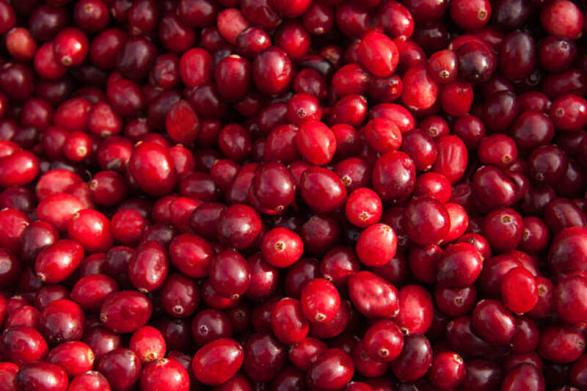A Berry Powerful Superfood: Exploring 6 Health Benefits of Cranberries
Jan 08, 2024 By Nancy Miller
Cranberries, small, tart fruits native to North America, are garnering attention in the health and wellness community for their exceptional nutrient profile. These tiny burgundy gems are packed with antioxidants, vitamins, and fiber, offering a wide array of health benefits. They are not just a festive fare, but a superfood that can be incorporated into our diet for a significant health boost. This article will delve into the powerful health benefits of cranberries, revealing why they deserve to be part of our daily nutritional intake. From combating infections to promoting heart health, cranberries are much more than a side dish at your Thanksgiving dinner. Let's explore the remarkable health benefits this superfood offers to both maintain our well-being and enhance our body's natural defense mechanisms.
Cranberries and Heart Health

Regular consumption of cranberries can contribute significantly to cardiovascular health due to their high antioxidant content which helps to lower the risk of heart disease. These antioxidants, notably flavonoids, are known to delay and inhibit the oxidation process of low-density lipoprotein (LDL) cholesterol, a key cause of plaque build-up in the arteries. This build-up leads to atherosclerosis, a condition that increases the risk of heart attacks and strokes.
Moreover, cranberries are rich in polyphenols, compounds acknowledged for their anti-inflammatory properties, that help in reducing blood pressure and inflammation in the blood vessels, enhancing overall heart health. With these compelling benefits, cranberries indeed play a crucial role in maintaining a healthy heart.
Cranberries and Immunity
Cranberries also play a significant role in strengthening the immune system due to their impressive vitamin C content. Vitamin C, also known as ascorbic acid, is a potent antioxidant that aids in protecting the body against harmful pathogens and boosts the immune function. It bolsters the body's natural defenses, promoting the production of white blood cells (lymphocytes and phagocytes) which help protect the body against infectious diseases and harmful free radicals.
The antioxidants and phytochemicals present in cranberries may further enhance the immune function by reducing inflammation and preventing the damage caused by oxidative stress. Therefore, regular intake of cranberries can be instrumental in providing an immune boost, especially during the cold and flu season.
Cranberries and Digestive Health
Cranberries offer a wealth of benefits for the digestive system as well, making them a useful food for promoting gastrointestinal health. They are a rich source of dietary fiber, a key element for maintaining a healthy and efficient digestive system. Fiber aids in enhancing the bulk and consistency of stool, promoting regular bowel movements and reducing the risk of constipation.
Moreover, cranberries contain unique antioxidants called proanthocyanidins, which have been found to inhibit the adhesion of certain harmful bacteria in the gut, including H. pylori, a bacteria that can cause stomach ulcers and gastritis. The regular consumption of cranberries can therefore help maintain a balanced gut flora, and prevent digestive disorders.
Additionally, studies suggest that cranberries may help in reducing the risk of certain types of cancer, specifically stomach cancer, thanks to their high antioxidant content and anti-inflammatory properties. Thus, integrating cranberries into your daily diet can provide a notable boost to your digestive health.
Cranberries and Skin Health
Cranberries, with their high antioxidant levels, also offer numerous benefits for the skin. Antioxidants are essential for fighting off free radicals that can cause damage to our cells and accelerate the aging process. They help in preserving the integrity of collagen, a protein responsible for maintaining skin elasticity and preventing wrinkles.
Cranberries are rich in vitamins A and C, which are known to promote skin health and repair damaged skin cells. Vitamin A aids in maintaining healthy skin by regulating the production of sebum, an oily substance that moisturizes and nourishes the skin, while vitamin C promotes collagen synthesis and protects against UV damage.
The anti-inflammatory properties of cranberries may also help in reducing redness and inflammation associated with various skin conditions like eczema and psoriasis. Overall, incorporating cranberries into your diet can help you achieve glowing, healthy skin.
Cranberries and Urinary Tract Health
One of the most well-known benefits of cranberries is their ability to prevent urinary tract infections (UTIs). Cranberries contain compounds called proanthocyanidins that prevent bacteria from attaching to the walls of the urinary tract, therefore reducing the risk of infection.
Cranberries have been found to be effective in preventing and treating recurrent UTIs, especially in women. The high levels of antioxidants present in cranberries may also help in reducing inflammation and promoting healing in the bladder and urinary tract.
Cranberries and Oral Health

Cranberries are also beneficial for maintaining good oral health. The polyphenols and flavonoids found in cranberries may help prevent plaque formation by inhibiting the growth of bacteria that can cause tooth decay and gum disease. These compounds have also been linked to reducing bad breath and promoting overall gum health.
The high vitamin C content in cranberries is essential for keeping gums healthy and preventing periodontal diseases. Vitamin C aids in collagen synthesis, which is vital for maintaining the strength and integrity of gums.
Conclusion
Cranberries are a true superfood that offer numerous health benefits. From promoting heart health and boosting immunity to improving digestive and skin health, cranberries are an excellent addition to any diet. So next time you're at the grocery store, make sure to add some of these nutrient-rich berries to your cart! Overall, by incorporating cranberries into our diets, we can reap the numerous benefits they offer and lead a healthier, more vibrant life. So why wait? Start enjoying cranberries today and experience the positive impact on your overall health and well-being. Happy eating!








